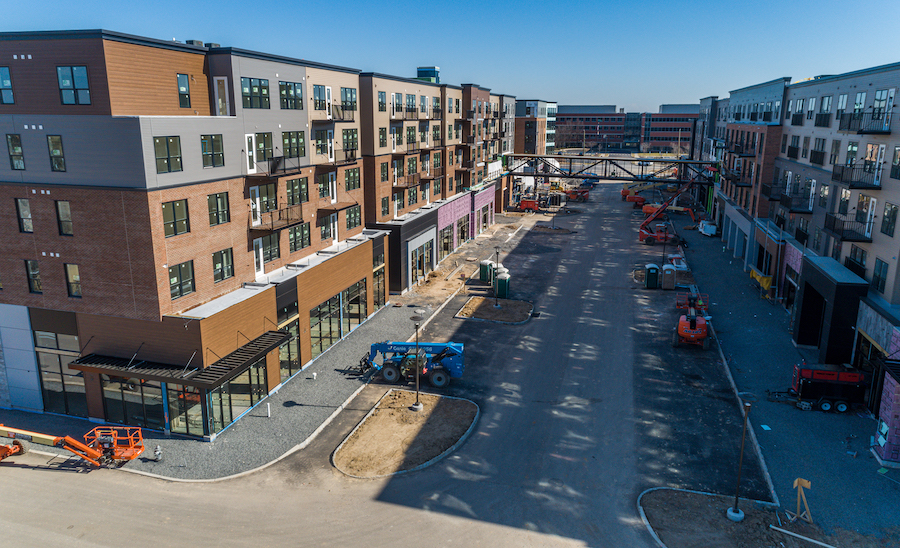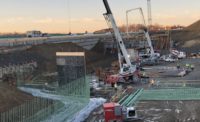After sitting idle for approximately six weeks, nonessential construction sites across Pennsylvania are gearing up to resume work on May 1. In doing so, project teams must adhere to new COVID-19 safety regulations released by Gov. Tom Wolf (D) on April 24. Wolf became one of the first governors in the country to shut down all but essential projects on March 19.
In late April, Wolf said nonessential work could resume on May 8 before he moved up the restart date by a week. “We recognize that the construction industry is vital to Pennsylvania’s economy,” Wolf said in a statement, “and may operate safely with stringent guidance in place that will protect employees and the public.”
For ENR’s latest coverage of the impacts of the COVID-19 pandemic, click here
Project teams resuming work on May 1 not only lost time due to the shutdown, but they are also expecting to experience decreased productivity working under the new COVID-19 protocols. The $120-million mixed-use Promenade @ Upper Dublin in Upper Dublin, for example, was originally scheduled to open in October. Now the project’s contractor, IMC Construction Inc., says the project is slated to open in December.
The Malvern, Pa.-based firm had seven other projects shut down by the governor’s order. “Although painful, we feel the shutdown saved lives,” says Robert Cottone, IMC’s president and chief executive. He says the firm is “delighted to get back to work.”
Local governments may also impose more strict requirements than those issued by Wolf’s office. Mike Stanton, project development manager at Conshohocken, Pa.-based developer How Group, says he isn't sure the COVID-19 construction rules Philadelphia released on April 29 will impact his firm's jobs in the city. For example, How Group is building an $11-million mixed-use project that was on schedule to deliver 49 apartments and 2,500 sq ft of commercial space on Aug. 15 before the statewide shutdown order was issued. The project is now scheduled to be completed on Oct. 1. “Those requirements could impact the adjusted schedule once we are back on-site working,” he said.
Wolf's COVID-19 safety guidelines require workers to cover their faces and social distance. Hand washing and sanitizing stations must be installed and protocols must be established if workers at the site have been exposed to a person who is a probable or confirmed case of COVID-19. Cleaning and sanitizing protocols for high-risk transmission areas must also be established and contractors must identify a “pandemic safety officer” on each job site.
Developed with input from the General Contractors Association of Pennsylvania (GCAP), the guidelines also require employee shifts to be staggered, tool sharing to be limited and the number of workers in enclosed portions of non-residential or commercial projects to be restricted depending on the size of the enclosed site.
Jon O’Brien, executive director of GCAP and the Keystone Contractors Association, says Wolf’s offices adopted two of the three suggestions that the group offered after reviewing the guidelines. While the governor didn’t honor GCAP’s request to remove limits on the number of workers at job sites, he did adopt the suggestion to exclude non-laborers such as owners, architects and construction managers toward the worker limit. Wolf also took GCAP’s suggestion to not put worker limits on exterior commercial construction.
O’Brien credited GCAP’s lobbying success to the fact when Wolf first issued his order, the group didn’t push the governor to classify all construction as essential work. Instead, O’Brien, says the group thought construction would “resume faster” if “we can demonstrate to the Administrative that we can safely operate.” GCAP published its own safety response plan to COVID-19 along with the Master Builders’ Association.
“We held true to our commitment to safety and I think the right people heard us.”
David Daquelente, executive director of the Master Builders’ Association of Western Pennsylvania, adds, “We believe that our industry and signatory contractors are well qualified to enforce and adapt to new safety requirements after demonstrating this competency over decades of increasing safety compliance.”
Daquelente says members who have been allowed to continue work on life-sustaining projects the last six weeks have shared best practices for adapting to a post-COVID-19 project site with their counterparts whose projects have been inactive. “We are confident that our contractors will continue to take the health and safety of their employees and projects as a priority,” he said.
For example, Philadelphia-based Hill International Inc. created its own Pandemic Mitigation Plan, which includes “a variety of general safety procedures” but is also “tailored to suit the specific needs of clients and projects,” says Kenneth Olup, vice president at Hill. Olup said the firm "made the plan freely accessible to clients,” including the Allegheny County Airport Authority, which Olup said has "found aspects of Hill’s Pandemic Mitigation Plan particularly useful in developing their own COVID health and safety plans.”
Olup said much of Hill's work for the Pennsylvania Dept. of Transportation and the Pennsylvania Turnpike Commission was put on hold in March before being allowed to move forward as essential work.
“Construction is a key part of Pennsylvania’s economy, and the men and women that work on construction sites across the Commonwealth are eager to get back to work,” Olup said.
Daquelente acknowledged that some workers are hesitant to "return to work during this pandemic, but we know that labor leaders in our region have been educating their members on best practices so they can be prepared to be safe and still productive when their work opportunity returns."
He added: “We all have a collective responsibility to get this right so that we continue to flatten the curve and get back to what we do best.”






Post a comment to this article
Report Abusive Comment